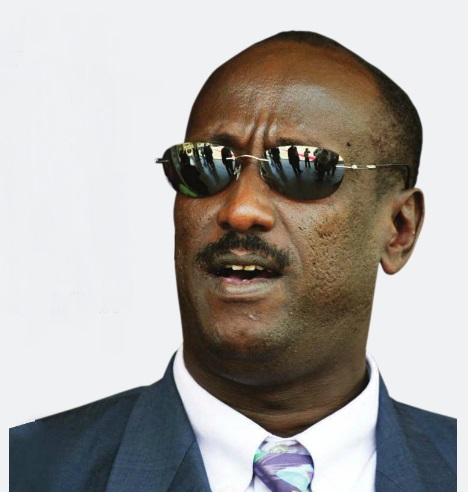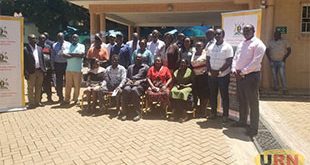
Gen. Saleh now running Museveni’s government
On July 21, a group of Kampala traders met at Serene Suites, a boutique hotel of two boxlike four-story blocks on top of Mutundwe Hill on the edges of the city that has become a sort of headquarters for the financially-distressed business people. The hotel is owned by one Esther Ampumuza, a middle-aged woman with a leg in many business and philanthropic ventures, including the international multi-level marketing company Dynapharm, where she is the president for the Africa region, and AfriAid, a relief agency where she is a director.
In many of her ventures, Ampumuza works hand in glove with President Yoweri Museveni’s younger and very influential brother, Gen. Caleb Akandwanaho aka Salim Saleh.
In fact, Saleh has since late 2014 been occupying the only presidential suite at Serene Suites that costs US$1,000 per night. Saleh also maintains an office at the hotel. Saleh’s presence with the attendant heavy security deployment and endless visiting delegations that include the Who is-Who in Uganda’s political and business world has led Serene Suites to be called “the other State House”.
On this day, however, Saleh was nowhere to be seen as the Kampala traders met in a tent in the hotel grounds just across the swimming pool.
Many narrated how the current tough economic environment has put their businesses in distress and led them to seek a bail-out from President Museveni through Ampumuza and Saleh.
One speaker wondered why they are not getting a share of major contracts in the ongoing large infrastructure projects. Another complained about the Central bank raising the Central Bank Rate (CBR), which in turn makes commercial banks hike interest rates. None of the speakers appeared to be from any of the big business or manufacturers who are also seeking to be bailed out by the government to the tune of Shs1.3 trillion (Approx. $384 million).
Given that the companies on a list that continues to circulate have to pay Shs 1.3 trillion and that the total value of nonperforming loans is Shs. 1.8 trillion, it is possible those attending this meeting fall in the category that needs the remaining Shs 500 billion.
Uganda’s top business entities, including the steel manufacturers Roofings Ltd and Steel and Tube, and Simba Group of Patrick Bitature, which is into telecoms, electricity generation, agriculture and real estate, are all on the list that has been circulating. There are also maverick businesses like that of Desh Kananura, the owner of Panamera Bar.
Serene Suites is also on the list requesting a bail out of Shs 3 billion to pay a loan the proprietor took from Uganda Development Bank.
Several top government officials, including from the Central bank, ministry of finance, and the National Social Security Fund, have all denied there is a major bail out coming. However, informed sources have told The Independent, not to write it off until President Museveni gives the final word on it. According to the source, several salvage options for distressed companies are being considered.
So the small players at Serene Suites, in fact, complained about the big players on a list that is allegedly to be bailed out. One said even some of the businesses that are slated to get bail out money are people who did not support President Museveni in the February election.
“Mzee (President Museveni) did not know about this,” one of them reassured the attendees, “but now, he has said that he will support his people (distressed businesses) even if it means changing the law.”
As the The Independent reported in our story titled `Fight over Museveni’s business bailout money’ of July 15, President Museveni on July 09 summoned top officials from the Ministry of Finance, the Central Bank and Uganda Revenue Authority (URA) for a meeting at State House, Entebbe to discuss the bailout.
Records from the Central bank show that commercial banks in Uganda lent out some Shs 21.9 trillion. Of this, Shs 1.8 trillion has been declared to be Non-Performing Assets on the books of several banks. Some banks have been hit more than others.
Among those who attended what has been described as a high stakes meeting was Deputy Central Bank Governor Louis Kasekende and URA Commissioner General Doris Akol. Others included officials from the finance ministry, and Gen. Saleh, who is the head of Museveni’s poverty fighting creation called Operation Wealth Creation.
That meeting was discussing what to do for over 100 Ugandan companies that are reeling under heavy commercial bank loans.
The meeting followed several others in which technocrats from the Central bank and the finance ministry have sharply disagreed and opposed plans by some top politicians to have the government fork about Shs 2 trillion (it keeps growing as more names are added to the list) from the public purse to pay off the loans owed to commercial banks and save private businesses, whose assets some banks have already started attaching.
Saleh reportedly made the case for the companies because he was the first to be approached by business people and has been deeply involved in lobbying for them. At one point he summoned Finance Minister Matia Kasaijja to Serene Suites to discuss the matter.
 The Independent Uganda: You get the Truth we Pay the Price
The Independent Uganda: You get the Truth we Pay the Price




Is Salim Saleh playing the “false brother?” General Salim Saleh has always played the mysterious- the enigmatic part of President Museveni’s leadership. He is, his clandestine mover albeit not so smooth. He has been involved in a number of scandals that paint the President in bad light. He was involved in the junk helicopter scandal, in the plundering scandal of the DRC, he has Uganda’s record of being the first and so far the last state Finance Minister in charge of micro-finance. He’s also a senior six graduate in the Swahili language. But today, I am using the term “false brother” as levity to signify a much deeper problem. The pending government bailout of the so called private rich companies has caused a battle of wagging tongues. The latest in the fray being Ofwono Opondo the
Director at the Uganda Media Centre. Hosted on the Capital Gang (a radio talk
programme), Opondo revealed that the Kwagalana group (a loose grouping of the rich) under the auspices of Hon. Amelia Kyabadde (Minister of Trade) met with the President to convince him to direct government buy (nationalise) their shopping arcades. This revelation was after Ramathan Ngobi and Ibrahim Ssemujju suggested that Uganda was facing an economic crisis upon which, Abdul Kantuntu had proposed a dialogue of the key stake holders. I find it an intolerable irony that the “poor” are to bailout the “rich.” If the “Ugandan rich” have become poor, how can they be bailed out by the remaining “not rich Ugandans?” The explanation is, that government is going to take money from the consolidated fund and give it out to individuals and private businesses to advance their personal selfish interests. If
government follows through the bailout plan, it will be confiscating the surplus of the poor to feed the industries and cities of the rich. This calls for an audited plan by the office of the Auditor General. Let there be a sanctioned plan by Parliament on how government can rescue private enterprises. Before the Kwagalana group comes forward with their paunches asking for a financial bailout, let them present their records of accounts to the authorities. My quarrel is not against the principle of government bailing out private companies, it is an ethical argument that the method being applied does not justify it. In 1859, Karl Marx tried to
define what was and wasn’t socialism. In a telling phrase he questioned, ‘Does
a movement or society claiming to be socialist in fact institutionalise the power of the people over the means of production? Or does it rationalise the power of the dominant class over the people?’ In Uganda do we run a free economy or a state economy? The pseudosocialisms is what Marx termed as “false brothers.”
This whole thing has been very interesting for me. The rich-“poor” have made their noise already. We are blaming them, yet they have a problem that has been created over 30 years. Now, the wonderful working/middle class small traders are comfortable. They think its just fine. Maybe they do not have debts, I hope the salary loans from banks, the multiple debts from money lenders, debts from micro finances, debts from markets for just buying food are all being managed well. Should I list it all, mortgage loans, car loans, personal loans, moneylender loans, etc all by one person!!!! Search your entire wardrobe guys and then see whether we are heading to a proper direction. Is this an individual problem now or it had better become of Very serious Public concern. I am talking about the rest apart from the rich who have made a move!!!! You here of a serious debt crisis and your are probably part of it (running to borrow from money lenders to buy just food!!!) and you are remaining silent. I rest my case.